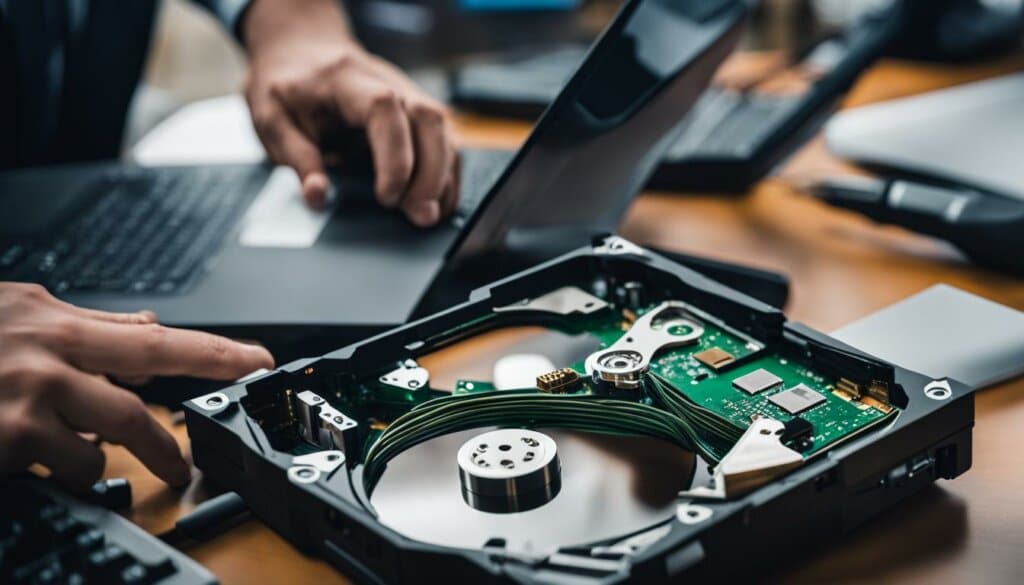Table of Contents
Cyber forensics plays a critical role in ensuring data safety and thwarting digital threats in the field of cybersecurity. It involves the collection, processing, preservation, and analysis of computer-related evidence to identify network vulnerabilities, mitigate risks, and investigate cybercrimes.
Digital forensics, also known as computer forensics, is a specialized field that focuses on the investigation and analysis of digital evidence. Cyber forensics professionals utilize a range of tools and techniques to extract valuable information from digital devices, networks, and systems. This evidence can be crucial in identifying cybercriminals, understanding attack patterns, and strengthening cybersecurity defenses.
The Growing Need for Cyber Forensics
In today’s digital landscape, cyber criminals are becoming increasingly sophisticated, posing a significant threat to individuals, businesses, and governments alike. As a result, the need for cyber forensics professionals is growing rapidly. These experts play a crucial role in identifying, investigating, and mitigating cyber security breaches, ensuring the safety and integrity of digital systems.
According to recent reports, there has been an alarming increase in cyber security breaches worldwide. In 2018 alone, there was an 11% rise in these incidents, resulting in an estimated cost of $600 billion. The scale and complexity of these attacks require highly skilled professionals who specialize in digital forensics.
Digital forensics is the practice of collecting, preserving, and analyzing digital evidence to uncover cyber criminals’ activities and hold them accountable. It involves the use of sophisticated tools and techniques to extract and interpret data from various digital sources, such as computers, smartphones, and networks.
By leveraging their expertise in areas such as data recovery, network analysis, and forensic analysis, cyber forensics professionals can identify the techniques and tactics employed by cyber criminals. This valuable knowledge helps organizations strengthen their cyber security defenses, prevent future attacks, and ensure the swift resolution of any security incidents that may occur.
The Scope of Digital Forensics in Cyber Security
Digital forensics plays a crucial role in ensuring data protection and conducting effective cybercrime investigations. It is utilized across various industries and organizations that collect and safeguard data from internet users. These include social media platforms, law enforcement agencies, financial institutions, and government entities. By employing digital forensics professionals, these organizations can detect and investigate cybercrimes, ensuring the security of their users and systems.
In the realm of social media, digital forensics helps uncover evidence of illegal activities, such as cyberbullying or online harassment, enabling swift intervention to protect users. Law enforcement agencies heavily rely on digital forensics to access and analyze electronic evidence in criminal investigations. This invaluable support aids in building strong cases against cybercriminals and ensuring justice is served.
Financial institutions leverage digital forensics to safeguard sensitive financial data and detect fraudulent activities within their systems. By analyzing digital evidence, they can identify and mitigate potential risks, protecting both the financial institution and its clients from cyber threats.
Table: Applications of Digital Forensics in Various Industries
| Social Media Platforms | Law Enforcement Agencies | Financial Institutions |
|---|---|---|
| Uncover evidence of illegal activities | Access and analyze electronic evidence | Safeguard sensitive financial data |
| Swift intervention in cyberbullying or online harassment cases | Build strong cases against cybercriminals | Detect and mitigate potential risks |
| Ensure justice is served | Protect financial institution and clients from cyber threats |
Overall, digital forensics is a critical component of cybersecurity, providing organizations with the necessary tools to investigate cybercrimes, protect sensitive data, and prevent future security breaches. Its wide-ranging applications make it an indispensable field in the fight against cyber threats.
Essential Skills for Digital Forensics Professionals
Being a digital forensics professional requires a range of essential skills to effectively navigate the complex world of cybersecurity. These skills include a deep understanding of computers and technology, as well as a firm grasp of cybersecurity principles and practices. In addition to technical expertise, digital forensics professionals must possess strong investigative abilities and critical-thinking skills to analyze and interpret digital evidence.
One of the key skills needed in this field is a comprehensive knowledge of computers and technology. Professionals must be well-versed in computer systems, networks, and software applications to effectively examine and analyze digital evidence. They must also stay up-to-date with the latest advancements in technology to stay ahead of cybercriminals.
In addition to technical skills, digital forensics professionals must have strong investigative abilities. They must be detail-oriented and meticulous in examining digital evidence, ensuring that no stone is left unturned. Critical-thinking skills are also crucial, as professionals must be able to analyze evidence, identify patterns, and connect the dots to uncover the truth behind cybercrimes.
Effective communication and collaboration skills are also vital for digital forensics professionals. They often work closely with law enforcement agencies, legal professionals, and other cybersecurity experts. The ability to effectively communicate findings and collaborate with various stakeholders is essential in ensuring that evidence is properly interpreted and investigations are successful.

Essential Skills for Digital Forensics Professionals:
- Deep understanding of computers and technology
- Firm grasp of cybersecurity principles and practices
- Strong investigative abilities
- Critical-thinking skills
- Effective communication and collaboration skills
These essential skills form the foundation for a successful career in digital forensics. By continuously developing and honing these skills, professionals can make significant contributions to solving cybercrimes, protecting sensitive data, and ensuring a safer digital landscape.
Making a Difference through Digital Forensics
Digital forensics professionals play a vital role in criminal justice by using their expertise in digital investigation to catch criminals and solve crimes. Their work involves analyzing digital evidence, conducting forensic examinations, and providing expert testimony in legal proceedings. Through their efforts, digital forensics experts contribute to the justice system by bringing criminals to justice and ensuring the integrity of evidence in court.
One notable example of the impact of digital forensics in criminal investigations is its role in the identification and prosecution of individuals involved in illegal activities. By analyzing digital devices, digital forensics professionals have helped law enforcement agencies uncover evidence related to crimes such as child exploitation, fraud, and cyber terrorism. Their work not only assists in catching criminals but also helps protect potential victims and prevent future crimes.
In addition to their contribution to criminal investigations, digital forensics professionals have also played a key role in solving complex cases. By uncovering digital evidence and analyzing it meticulously, they have been able to provide crucial insights and breakthroughs in cases that would have previously remained unsolved. Their expertise in digital forensics has proven to be invaluable in unraveling intricate criminal schemes and providing justice for victims.
| Benefits of Digital Forensics in Criminal Justice |
|---|
| 1. Catching criminals and solving crimes |
| 2. Protecting potential victims |
| 3. Preventing future crimes |
| 4. Providing insights and breakthroughs in complex cases |
Quote:
“Digital forensics professionals play a crucial role in the criminal justice system, using their expertise to catch criminals and solve crimes. Through their work, they contribute to ensuring justice for victims and safeguarding society from digital threats.” – Digital Forensics Expert
Overall, the field of digital forensics has proven to be instrumental in the criminal justice system. It offers a unique blend of technology, investigative skills, and legal knowledge, making it a rewarding and impactful career path for those interested in making a difference in the fight against crime.
Career Opportunities in Digital Forensics
With the increasing demand for cyber security defenses, there is a growing need for professionals in digital forensics. As the threat of cybercrime continues to rise, companies and organizations are actively seeking individuals with expertise in this field to protect their sensitive data and systems. A career in digital forensics offers exciting opportunities to work as ethical hackers and cyber security specialists, ensuring the safety and integrity of digital networks and information.
To pursue a career in digital forensics, education plays a crucial role. Obtaining a degree in a relevant field, such as computer science or cyber security, provides a solid foundation of knowledge and skills. Many universities and colleges offer specialized programs or concentrations in digital forensics, equipping students with the necessary expertise to navigate the complexities of investigating cybercrimes and protecting digital assets.
One of the key advantages of a career in digital forensics is the continuous learning and professional growth it offers. The field is constantly evolving as cyber threats become more sophisticated, requiring professionals to stay updated with the latest technologies, techniques, and tools. This ongoing learning process ensures that digital forensics professionals remain at the forefront of cyber security practices, making them highly sought after in the job market.
| Career Opportunities in Digital Forensics | Education Requirements |
|---|---|
| Ethical Hacker | Bachelor’s degree in computer science or cyber security |
| Cyber Security Specialist | Bachelor’s degree in cyber security or related field |
| Forensic Analyst | Bachelor’s degree in digital forensics or computer science |
Aside from the numerous career opportunities and professional growth, a career in digital forensics also offers competitive salaries. Due to the demand for skilled professionals in this field, salaries in digital forensics can be quite lucrative, especially for individuals with extensive experience and expertise. The combination of job satisfaction, continuous learning, and salary potential makes digital forensics an attractive career option for those passionate about cyber security and protecting digital assets.
Key Takeaways:
- Career opportunities in digital forensics are on the rise due to the increasing need for cyber security defenses.
- Education in a relevant field, such as computer science or cyber security, is crucial for entering this field.
- Continuous learning and professional growth are integral to staying ahead in the constantly evolving field of digital forensics.
- A career in digital forensics offers competitive salaries, making it an attractive option for those passionate about cyber security.
The Process of Computer Forensics
Computer forensics is a crucial aspect of digital investigations that involves the recovery of data from devices to uncover evidence of criminal activity. Professionals in this field work closely with investigators, law enforcement agencies, and companies to access and analyze digital evidence. Whether it’s assisting with a criminal investigation or aiding in data recovery for organizations, computer forensics requires a strong understanding of programming, hardware, and software knowledge.
The Role of Computer Forensics Professionals
Computer forensics professionals play a vital role in uncovering evidence that can be used to build a case against cybercriminals. By retrieving data from devices, such as computers, smartphones, and other digital storage media, they can gather crucial information related to a criminal act. This data can include deleted files, internet browsing history, email conversations, and chat logs, all of which can provide valuable insights into the activities of a suspect.
Computer forensics professionals are skilled in using specialized tools and techniques to recover deleted or encrypted data, ensuring that the evidence is admissible in court. Their expertise in programming, hardware, and software allows them to navigate through complex systems and protect the integrity of the data they uncover. Whether it’s recovering data from a suspect’s device or helping a company restore lost information, computer forensics professionals are essential in the realm of digital investigations.
A Day in the Life of a Computer Forensics Professional
The work of a computer forensics professional is varied and can involve both reactive and proactive tasks. On the reactive side, they may be called in to investigate a cybercrime incident, such as a data breach or hacking attempt. This involves analyzing digital evidence, identifying the source of the attack, and providing law enforcement agencies or organizations with the necessary evidence to pursue legal action. On the proactive side, computer forensics professionals may work closely with companies to implement robust security measures and perform regular audits to identify potential vulnerabilities before they are exploited.
| Key Skills of a Computer Forensics Professional | Description |
|---|---|
| Programming Knowledge | Proficiency in programming languages allows computer forensics professionals to write scripts and develop custom tools to aid in data recovery and analysis. |
| Hardware Expertise | Understanding the inner workings of computer hardware helps computer forensics professionals identify potential sources of evidence and recover data from various storage media. |
| Software Understanding | Familiarity with forensic software tools enables computer forensics professionals to effectively analyze digital evidence, uncover hidden data, and present findings in a clear and concise manner. |
Computer forensics is a dynamic field that requires a unique blend of technical expertise, analytical thinking, and problem-solving skills. With the ever-increasing prevalence of cybercrimes, the role of computer forensics professionals will continue to be crucial in the pursuit of justice and the protection of digital assets.

Computer Forensics in Cybercrime Prevention
Computer forensics, although primarily a reactionary practice that occurs after a security breach, plays a crucial role in the prevention of cybercrime. By analyzing and understanding the methods used by cyber criminals, valuable insights can be gained to inform and guide cyber security professionals in strengthening their defenses. The information uncovered by computer forensics professionals can provide valuable knowledge that can help prevent future cybercrimes.
Through the examination of digital evidence, computer forensics professionals can identify vulnerabilities and weaknesses in systems that were exploited by cyber criminals. This knowledge can then be used to implement preventive measures and security enhancements to protect against similar attacks in the future. By staying one step ahead of cyber criminals, organizations can significantly reduce the risk of falling victim to cybercrimes.
“Computer forensics professionals play a crucial role in proactively preventing cybercrimes by uncovering valuable information that can inform and guide cybersecurity practices.”
Additionally, computer forensics can aid in the identification of potential threats and the early detection of cybercriminal activities. By monitoring and analyzing network logs, anomalies or suspicious activities can be detected, allowing cybersecurity teams to respond swiftly and effectively to prevent further damage. This proactive approach to cybercrime prevention is essential in maintaining the security and integrity of digital systems.
In summary, while computer forensics is primarily a reactionary practice, it serves as a valuable tool in the prevention of cybercrime. By uncovering crucial information and insights, computer forensics professionals can inform and guide cybersecurity practices, identify vulnerabilities, and detect potential threats. Through these proactive measures, organizations can fortify their defenses and significantly reduce the risk of falling victim to cybercrimes.

The Impact of Digital Forensics in Criminal Investigations
Digital forensics professionals play a crucial role in criminal investigations, working closely with law enforcement agencies to access and analyze evidence from electronic devices. They possess the expertise to recover, preserve, and interpret digital data, which can be vital in solving cybercrimes and bringing criminals to justice. Furthermore, digital forensics professionals assist private companies in recovering lost data caused by cybercrime incidents, providing valuable support in restoring normal operations.
The evidence uncovered through digital forensics can be used to build strong cases against cybercriminals and present compelling arguments in court. By analyzing the digital footprints left behind by criminals, investigators can gather critical information about their activities, intentions, and networks. This evidence can also help identify patterns and trends, enabling law enforcement agencies to stay one step ahead of cybercriminals and prevent future cybercrimes.
Private companies, too, benefit from the expertise of digital forensics professionals. In the event of a cybercrime incident, these professionals can assist in the recovery of lost data, minimizing the impact on businesses and ensuring continuity of operations. By identifying the vulnerabilities that led to the incident and conducting thorough investigations, digital forensics experts help companies strengthen their cybersecurity measures and prevent future attacks.
| Benefits of Digital Forensics in Criminal Investigations |
|---|
| Digital forensics professionals work closely with law enforcement agencies to access and analyze evidence from electronic devices. |
| Recovering and interpreting digital data is crucial in solving cybercrimes and bringing criminals to justice. |
| Private companies benefit from the expertise of digital forensics professionals in recovering lost data and strengthening cybersecurity measures. |
The Benefits of a Career in Digital Forensics
A career in digital forensics offers numerous benefits for individuals interested in making a meaningful impact in the fight against cybercrime. Here are some key advantages of pursuing a career in this field:
- Job Satisfaction: Working in digital forensics provides a sense of satisfaction knowing that you are contributing to a safer digital landscape. By uncovering evidence and assisting in the investigation of cybercrimes, you can help bring criminals to justice and protect individuals and organizations from digital threats.
- Continuous Learning: The field of digital forensics is dynamic and ever-evolving. Technology and cyber threats are constantly changing, requiring professionals to stay updated with the latest tools, techniques, and trends. This provides ample opportunities for continuous learning and professional growth.
- Professional Growth: As the demand for skilled digital forensics professionals continues to rise, there are ample opportunities for career advancement. With experience and expertise, you can take on leadership roles, lead investigations, and even specialize in niche areas of digital forensics, such as mobile forensics or network forensics.
- Salary Potential: Due to the critical nature of their work and the increasing demand, digital forensics professionals can enjoy competitive salaries. According to the Bureau of Labor Statistics, the median annual wage for forensic science technicians, which includes digital forensics professionals, is around £59,000 (source: Bureau of Labor Statistics, 2022).
In conclusion, a career in digital forensics offers job satisfaction, continuous learning, professional growth, and promising salary potential. It is a rewarding field where individuals can make a difference by combating cybercrime and contributing to a safer digital environment.

| Benefits | Description |
|---|---|
| Job Satisfaction | Contribute to a safer digital landscape by uncovering evidence and assisting in the investigation of cybercrimes. |
| Continuous Learning | Stay updated with the latest tools, techniques, and trends in the dynamic field of digital forensics. |
| Professional Growth | Opportunities for career advancement, leadership roles, and specialization in niche areas of digital forensics. |
| Salary Potential | Competitive salaries with the increasing demand for skilled digital forensics professionals. |
Conclusion
Cyber forensics plays a vital role in the field of cybersecurity, ensuring data safety and aiding in the investigation and prevention of cybercrimes. By collecting and analyzing digital evidence, cyber forensics professionals help identify network vulnerabilities, mitigate risks, and thwart digital threats. This field is crucial in our increasingly digital world, where cybercriminals are becoming more sophisticated.
The growing need for cyber forensics professionals is evident, as cyber security breaches continue to rise. Companies and government agencies rely on digital forensics experts to investigate criminal activity and uncover evidence. The scope of digital forensics in cybersecurity spans various industries and organizations, including social media platforms, law enforcement agencies, financial institutions, and government entities.
Pursuing a career in digital forensics offers rewarding opportunities, job satisfaction, and the potential for continuous learning and professional growth. As the demand for skilled professionals in this field continues to rise, individuals with expertise in cyber forensics can make a meaningful impact in fighting cybercrime and contribute to a safer digital landscape.
FAQ
What is cyber forensics?
Cyber forensics involves the collection, processing, preservation, and analysis of computer-related evidence to identify network vulnerabilities, mitigate risks, and investigate cybercrimes.
Why is cyber forensics important in cybersecurity?
Cyber forensics plays a critical role in ensuring data safety and thwarting digital threats. It helps in detecting and investigating cybercrimes, protecting users and systems, and providing evidence for criminal investigations.
Which industries and organizations use digital forensics?
Digital forensics is utilized by social media platforms, law enforcement agencies, financial institutions, and government entities, among others. These organizations employ digital forensics professionals to protect data and investigate cybercrimes.
What skills are required to become a digital forensics professional?
Digital forensics professionals should have a deep understanding of computers, technology, and cybersecurity principles. They should possess investigative abilities, critical-thinking skills, and analytical talent. Effective communication and collaboration are also crucial.
How does digital forensics make a difference in fighting cybercrime?
Digital forensics has helped catch individuals involved in illegal activities, solve crimes, track terrorists, and uncover fraud. It plays a vital role in criminal investigations and contributes to a safer digital landscape.
What are the career opportunities in digital forensics?
With the increasing demand for cyber security defenses, there is a growing need for professionals in digital forensics. Career opportunities include roles as ethical hackers, cyber security specialists, and forensic investigators.
What is the process of computer forensics?
Computer forensics involves the recovery of data from devices to uncover evidence of criminal activity. Professionals in this field use programming, hardware, and software knowledge to retrieve data without violating the suspect’s rights.
How does computer forensics contribute to cybercrime prevention?
Although computer forensics is a reactionary practice, the information uncovered can inform and guide cyber security professionals in implementing preventive measures. Understanding the methods used by cyber criminals helps strengthen cybersecurity defenses.
How does digital forensics impact criminal investigations?
Digital forensics professionals work closely with law enforcement agencies to access and analyze evidence from electronic devices. They also assist private companies in recovering lost data caused by cybercrime incidents, providing critical information for investigations.
What are the benefits of a career in digital forensics?
A career in digital forensics offers job satisfaction, continuous learning, and professional growth. With the ever-evolving nature of technology and cyber threats, there are ample opportunities for skill development and a promising salary potential.
Source Links
- https://www.cisa.gov/careers/work-rolescyber-defense-forensics-analyst
- https://www.ecpi.edu/blog/what-is-digital-forensics-in-cybersecurity-is-this-a-good-career-for-me
- https://www.devry.edu/online-programs/area-of-study/cyber-security/computer-forensics-vs-cybersecurity.html









